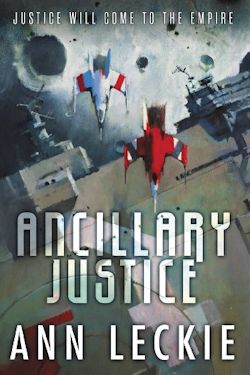Welcome back to the British Genre Fiction Focus, Tor.com’s regular round-up of book news from the United Kingdom’s thriving speculative fiction industry.
We begin this edition with Awards Watch—fast becoming a fixture of the Focus—in which we consider The Kitschies, particularly as regards the wide range of reactions to the mainstream novels nominated for the Red Tentacle.
Stay tuned for news, too, of new books by a whole host of genre fiction’s best and brightest, including the likes of James Smythe, Daniel Polansky, Ian Sales, Ben Aaronovitch. All that and much, much more in this week’s links.
Awards Watch: Considering The Kitschies
Tor.com has already reported on the announcement of the shortlists for the fifth year of The Kitschies, the betentacled book prize which promises to “reward the year’s most progressive, intelligent and entertaining works [of fiction which] contain elements of the speculative or fantastic,” and that means we get to skip the details. Not that they’re at all tedious! I’m only pleased that we’ll have a little longer to talk about the fallout…
Let’s start the prize party with this article in The Guardian:
The reclusive Thomas Pynchon might have shunned the National Book Awards last year, but organisers of The Kitschies are hoping the lure of a stuffed tentacle could bring the publicity-shy US author out of hiding after his multi-genre outing Bleeding Edge made the shortlist for this year’s best novel prize.
Pynchon is competing with poet Anne Carson and crossover novelist Patrick Ness on what must be one of the most varied shortlists in history for a science fiction prize.
To be completely clear, The Machine by James Smythe and A Tale for the Time Being by Ruth Ozeki were also nominated for the Red Tentacle… about which former winner and current judge Nick Harkaway noted:
This was an awe-inspiring year. For the Red Tentacle we could have built a shortlist composed purely of iconic names, and we had to reject at least one book which may be a work of genius because it did not entirely mesh with the Kitschies’ cardinal virtues.
In case you were wondering what that book was, as I was, the judges went on to make special mention of it:
Hari Kunzru’s Memory Palace was “quite literally a work of art, and one that that existed within a bigger, broader work of art—the V&A exhibition—that is neither a novel nor exists any more. It was a beautiful, lovely book on its own terms, certainly, and while it could have been read alone, to do so would have been to only cover a tiny percentage of what Memory Palace as a whole was about.”
Highly recommended by the panel, the judges felt that Memory Palace was worthy of special mention.
In addition, several titles were removed from consideration due to conflicts of interest.
These included Drakenfeld by Mark Charan Newton, Will Hill’s last Department 19 novel, The Glass God by Kate Griffin and Sarah Anne Langton for her work on the Fox Pocket project.
Side note: you know what’s nice? Seeing this sort of inside information disclosed in a public forum. And the management went one further, breaking down the record 234 literary submissions received in bar graphs and pie charts. More along these lines, please!
In any event, some loved the shortlists, others loved them less. Arthur C. Clarke Award Director Tom Hunter fell firmly into the former camp. He stopped off in the comments section of the aforementioned Guardian article to proffer the following praise:
The Kitschies are a shining light in the world of genre fiction prizes, and I’m loving this year’s shortlist choices more every time I look at them.
A fantastic range of inspiring books, a determination to highlight first time authors and a set of shortlisted cover art that blows a kraken-sized hole through the cliched notions of what speculative and fantastic literature should look like, and indeed who it is for.
Maybe this is one award that deserves to be announced more than once a year?
Hmm. Much as admire The Kitschies, on balance—and I think the judges would agree with me here—I think once a year is just right.

Meanwhile, Damien Walter baited “a shrinking coterie of hyper-specialised fans”—us, in other words—whilst speaking of the shortlists on his blog:
This year The Kitschies reflect the new emerging reality of speculative fiction—the most interesting and creative work in speculative fiction isn’t coming from within the field, but from outside it. The mainstream of literature and publishing have embraced spec.fic in all its forms. And they are now creating significantly more interesting work than the “genre fiction” community where spec.fic is most popular.
In contrast, genre fiction is retreating ever further in to what is generally called “core genre”. Books that please a shrinking coterie of hyper-specialised fans, while being somewhere between confusing and unreadable for general readers. Ann Leckie’s Ancillary Justice is the favoured “core genre” novel of the year, and likely to feature widely on award shortlists. As I discussed in my recent column for The Guardian, it’s a book of big ideas marred by a problematic writing style. And as Nina Allen commented in her review for Arc magazine, even those ideas are far from cutting edge.
Back to Harkaway, who admitted that though “this year’s lineup includes some ‘notionally mainstream’ novels […] he would ‘rather swallow [his] own teeth’ than set out to find a more literary list.”
In the end, these are the books submitted that best matched the Kitschies’ criteria in our collective judgement—but that’s not all they are. I’ve heard a well-known fiction prize described by a former judge as going to the book with the fewest enemies in the room. This is not that. These are books which knocked our socks off, sometimes to our surprise. They are speculative novels, rich and strange and brilliant, and it really doesn’t matter in this context whose imprint is on the spine or what the design brief for the cover was. They reward your attention, they are clever, engaging, critical and forward-looking. Try them and see what happens.
Me, I’ve tried three of the five best novel and best debut nominees already, enjoyed them awfully, and I solemnly promise to get to the others as soon as possible… if not necessarily before we hear about the winners, which will be announced just two weeks from today!
So what do you all make of The Kitschies’ shortlists?
Cover Art Corner: The Forever Watch
We’ve talked about Hodderscape’s big plans for the future in the Focus before, but don’t for a minute think the folks over there have been basking in their own brilliance since. On the contrary, they seem to be taking this genre fiction thing very seriously indeed: the past week alone has seen three unique reveals.
For one thing, Oliver Johnson’s Project Polansky—a chronicle of the process of putting together Daniel Polansky’s promising next novel, Those Above—is to begin imminently. In addition, Anne C. Perry has been back at it. We were well met on Monday by a bit about The Burning Depths: the first in a series of three new science fiction novels by James Smythe. Behold the blurb:
Centuries ago, the Australia left a dying Earth in search of an inhabitable planet its colonists could call home. But no such planet was ever discovered. Law and order gave way to rioting and chaos as gangs began battling for control of the ship and its dwindling resources, and the Australia was left to drift, directionless, through the emptiness of space. Seventeen-year-old Chan, fiercely independent and self-sufficient, keeps her head down and lives quietly, careful not to draw attention to herself amidst the violence and disorder. Until the day she makes an extraordinary discovery – a way to return the Australia to Earth. But doing so would bring her to the attention of the fanatics and the murderers who control life aboard the ship, putting her and everyone she loves in terrible danger. And a safe return to Earth is by no means certain.
The Burning Depths will be released next February.

But wait… there’s more! More that we’ll see sooner, too. David Ramirez’s debut is in fact just four months away, so the first word about The Forever Watch’s publication in the UK came hand in hand with some stupendous cover art. Hit up the Hodderscape blog for a look at Raid 71’s stark wraparound.
I smell a potential Inky Tentacle!
Here’s a bit about the book, too:
The Noah: a city-sized ship, half-way through an eight hundred year voyage to another planet. In a world where deeds, and even thoughts, cannot be kept secret, a man is murdered; his body so ruined that his identity must be established from DNA evidence. Within hours, all trace of the crime is swept away, hidden as though it never happened.
Hana Dempsey, a mid-level bureaucrat genetically modified to use the Noah’s telepathic internet, begins to investigate. Her search for the truth will uncover the impossible: a serial killer who has been operating on board for a lifetime… if not longer.
Things are getting interesting.
Odds and Sods
From May into August, the British Library is set to stage the largest ever exhibit of sequential art in the UK to date. It’s called Comics Unmasked and you can read all about it here.
Quercus, the parent publisher of genre fiction imprint Jo Fletcher Books, has put a For Sale sign up because of all the money it lost last year. Fingers crossed they secure a good buyer soon.
We were already aware of The Seventh Miss Hatfield by Anna Caltabiano, but Gollancz just doubled down on the up-and-coming young author. What do you know, folks? It’s a trilogy!
Speaking of trilogies, HarperVoyager has acquired a new one from Mark Lawrence. Set in the same world as the Broken Empire books, the new series begins with Prince of Fools in June.
And another major deal was revealed last week: Gollancz has contracted two more books—this is in addition to the pre-existing six—in the successful Rivers of London series by Ben Aaronovitch.
Last but not least, Ian Sales hopes to have copies of All That Outer Space Allows—the final volume of the awesome Apollo Quartet—ready for release come Loncon 3 in August… but as he hedges, “we’ll see how the research and writing goes.”
Niall Alexander is an extra-curricular English teacher who reads and writes about all things weird and wonderful for The Speculative Scotsman, Strange Horizons, and Tor.com. He’s been known to tweet, twoo.










